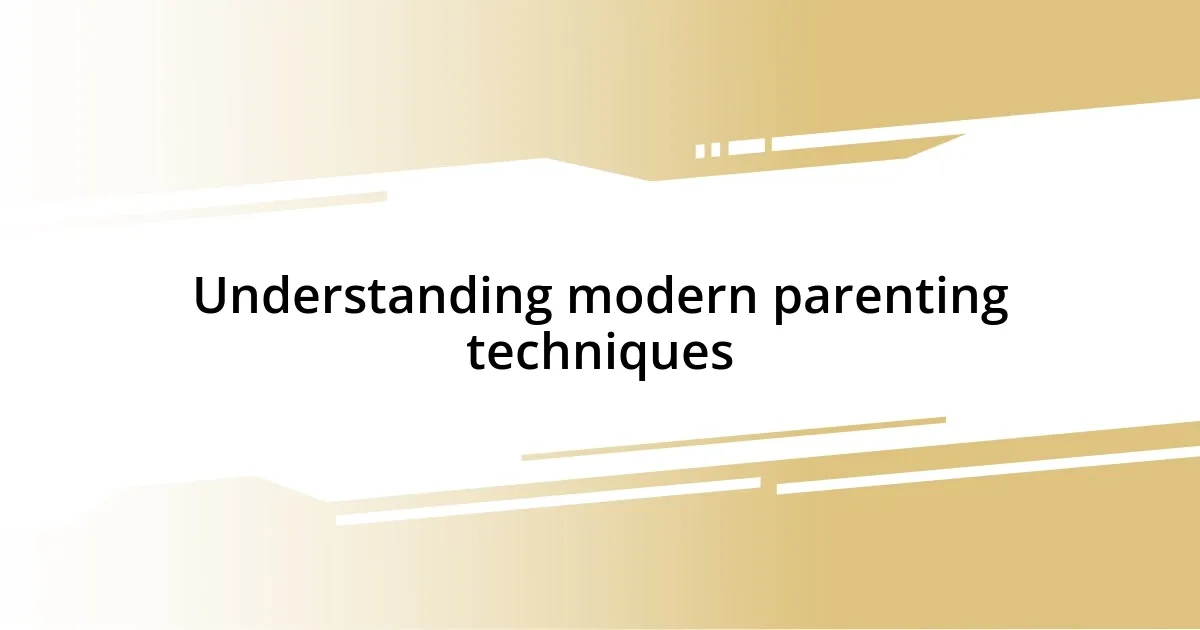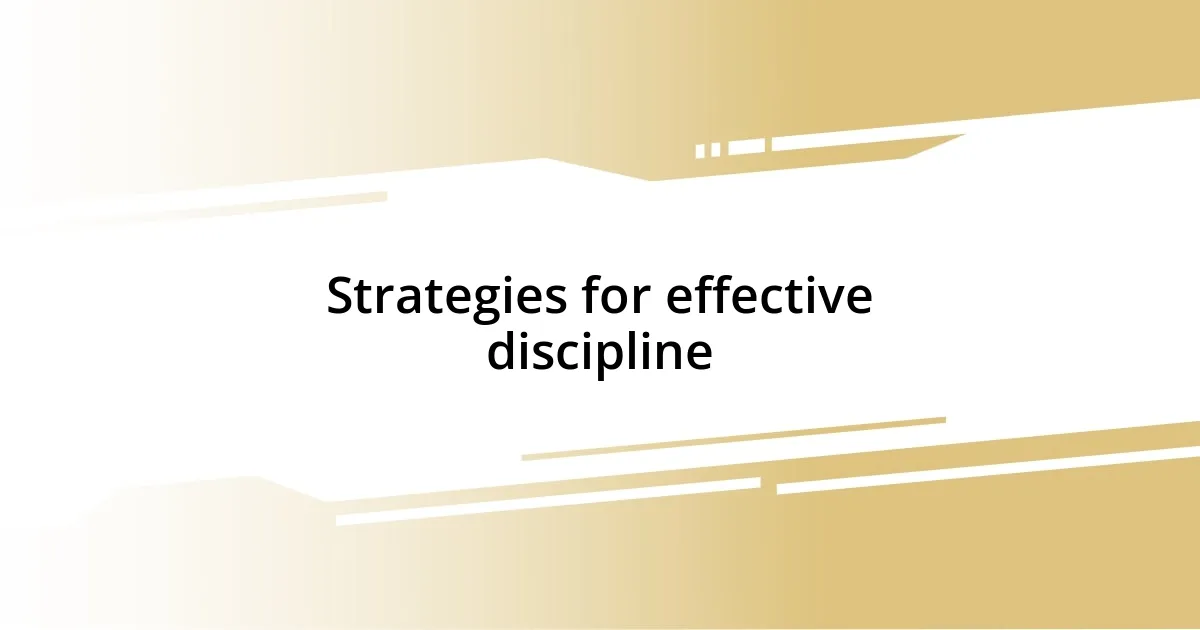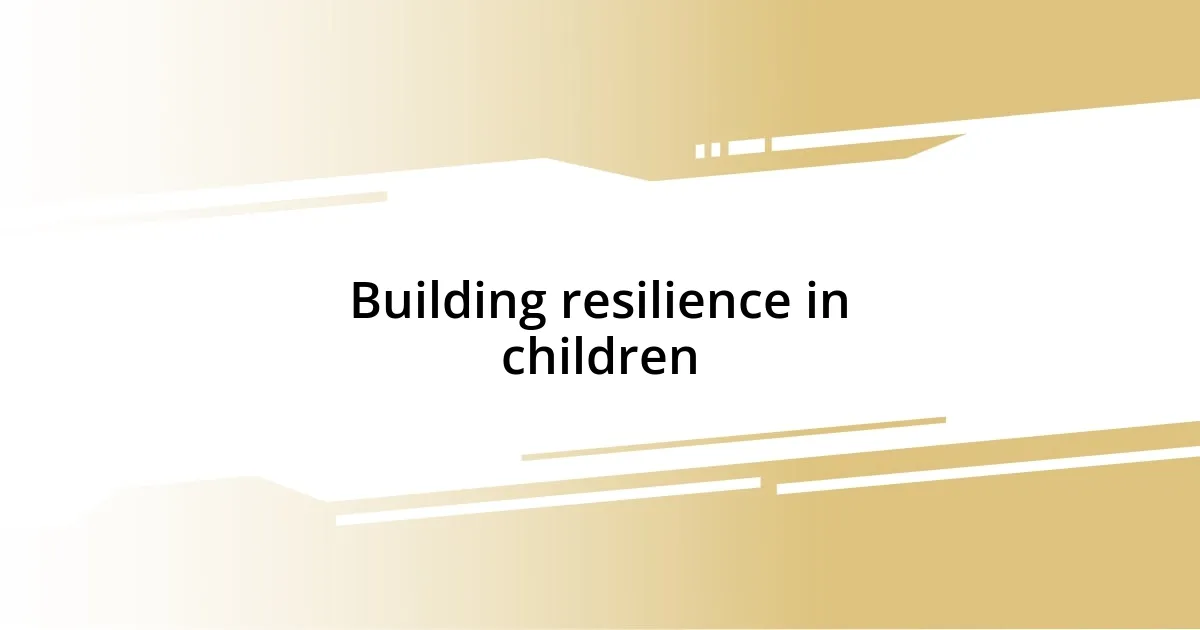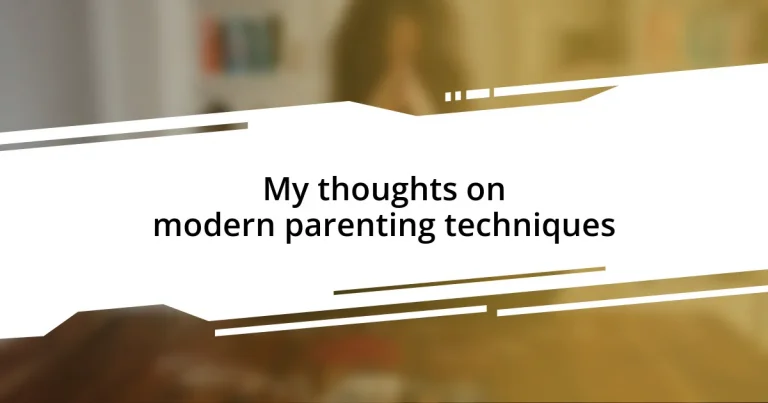Key takeaways:
- Modern parenting focuses on fostering independence, emotional intelligence, and open communication to enhance children’s confidence and relationships.
- Positive reinforcement encourages good behavior and builds trust, while effective discipline strategies emphasize empathy and natural consequences.
- Balancing screen time with physical play enhances creativity and connection, while building resilience involves helping children navigate challenges and celebrate small victories.

Understanding modern parenting techniques
In my journey as a parent, I’ve noticed how modern techniques often focus on fostering independence among children. For instance, encouraging kids to make choices, whether it’s about what to wear or which book to read, creates a sense of autonomy. Isn’t it fascinating how something as simple as a choice can build their confidence?
I remember a time when my daughter was hesitant to try a new sport. Instead of pushing her, I asked her what interested her about it. This approach led us to discuss her fears and eventually allowed her to embrace the opportunity on her own terms. Could my role as a guide rather than a director have had a deeper impact on her decision?
Another aspect of modern parenting is the emphasis on emotional intelligence. I’ve learned that acknowledging a child’s feelings, rather than dismissing them, has profound effects. What happens, I wonder, when we teach kids to articulate their emotions? When I validate my son’s feelings during a tantrum, it sparks meaningful conversations that not only ease his frustrations but also strengthen our bond.

Key philosophies of modern parenting
One philosophy that resonates with me is the concept of positive discipline. I’ve found that guiding children with empathy and understanding, rather than punishment, leads to a more respectful relationship. For instance, when my son accidentally broke his favorite toy, I chose to discuss the importance of being careful instead of scolding him. He not only learned a valuable lesson but also felt understood, which deepened our trust.
Here are some key philosophies of modern parenting:
- Positive Discipline: Focuses on teaching rather than punishing.
- Child-Led Learning: Emphasizes letting children explore their interests at their own pace.
- Mindfulness: Encourages parents to be present and attentive, shaping responsive interactions.
- Open Communication: Advocates for honest discussions about feelings, fostering emotional growth.
- Co-Parenting Practices: Involves collaborating with other parents to create a supportive community.

Benefits of positive reinforcement
Positive reinforcement has truly transformed the way I approach parenting. I’ve found that acknowledging good behavior, no matter how small, encourages my children to repeat those actions. For instance, when my daughter shares her toys with friends, I make it a point to highlight how wonderful it is to see her being so generous. This simple acknowledgment not only makes her smile but strengthens her understanding of kindness.
In my experience, using positive reinforcement builds a foundation of trust and confidence. I remember a specific moment when my son practiced his reading aloud to me. After he read a challenging passage, I praised his effort rather than focusing on the mistakes he made. The glow of accomplishment on his face was everything. It reinforced his belief in his abilities, leading him to eagerly want to read more the next day.
By fostering an environment where positive behavior is recognized, children feel valued and motivated. Instead of fear of punishment, they learn to embrace expectations and develop a sense of responsibility. In observing these transformations firsthand, I truly believe that a little praise goes a long way in establishing a positive, encouraging atmosphere at home.
| Positive Reinforcement | Traditional Discipline |
|---|---|
| Builds confidence | May foster fear of failure |
| Encourages good behavior | Focuses on correcting bad behavior |
| Strengthens parent-child relationship | Can create distance in communication |

Importance of open communication
Open communication is a cornerstone in my parenting journey. I’ve noticed that when I openly discuss feelings with my kids, it creates a safe space for them to express themselves. Just the other day, my daughter came to me feeling upset about a friend’s comment at school. Instead of brushing it off, I encouraged her to share more, which led to a heartwarming conversation about friendship and empathy. Moments like these not only strengthen our bond but also empower her to voice her thoughts in the future.
In my experience, being transparent about emotions helps my children navigate their feelings better. When my son was struggling with anxiety before a big presentation, I opened up about a time I felt the same way. I shared how I coped and reminded him that it was okay to feel nervous. This exchange not only eased his worries but also demonstrated that everyone has challenges, fostering a deeper emotional connection between us. Don’t you think sharing such experiences can make parents relatable and trustworthy?
Moreover, I genuinely believe that open communication cultivates emotional intelligence in children. When I regularly check in with them about their day, I not only get to know them better but also help them articulate their feelings. I recall a time when I asked my son how he felt about a recent family outing. His thoughtful response about wanting more adventure made us discuss what we could do next. These discussions provide rich insights into their world, making me more attuned to their needs. Isn’t it incredible how communication can enrich these parental interactions?

Strategies for effective discipline
In my experience, one effective discipline strategy is setting clear and consistent boundaries. I vividly remember a time when my son tested those boundaries after a friend spent the night. Instead of yelling or punishing him, I calmly reiterated the importance of our house rules, explaining why they exist. This approach not only reinforced the expectations but also invited him to appreciate the reasoning behind them. Isn’t it amazing how clarity can alleviate misunderstandings?
Another strategy I find valuable is implementing natural consequences. There was a moment when my daughter refused to wear a jacket on a chilly day. Instead of insisting she put it on, I allowed her to experience the cold. When we returned home, she enthusiastically grabbed her jacket for the next outing, having learned a lesson without my interference. I believe this method encourages children to take responsibility for their choices, creating a sense of accountability that benefits them in the long run.
Lastly, I’ve found that teaching empathy plays a crucial role in discipline. I often encourage my children to consider how their actions affect others. There was an instance when my son accidentally broke a friend’s toy during a playdate. Instead of lashing out, I guided him through apologizing and suggesting ways to make it right. By instilling empathy, I see my kids becoming more considerate and thoughtful in their interactions, which, frankly, is such a rewarding transformation to witness. Don’t you think cultivating empathy is one of the most impactful gifts we can give our children?

Balancing screen time and play
Balancing screen time and play is something I’ve really had to navigate carefully. I remember one afternoon when my son was glued to his tablet, completely absorbed in a game. I decided to intervene and suggested we head outside for a quick game of catch. To my surprise, he jumped at the chance. That moment reminded me how physical play can reignite creativity and connection, allowing him to recharge and enjoy the outdoors with me.
It’s fascinating how easy it can be to lose track of time with screens, isn’t it? Just the other day, I set a timer for my daughter’s tablet use, and when the timer went off, she was initially frustrated. Yet, once we got her outside to play hopscotch, I saw her mood shift drastically. Engaging in play not only alleviated her irritation but also sparked an impromptu dance party in the yard. This experience reinforced my belief that a balance can be achieved when kids experience both the allure of screens and the joy of active play.
Another aspect of this balance is leading by example. I’ve made it a priority to show my kids that I also disconnect from screens during family time. When we enjoy dinner together, I deliberately put my phone away. I’ve seen how this simple act encourages them to do the same, fostering conversations and connections that would be lost otherwise. How do you think your family time changes when screens are set aside? I can tell you from experience—it’s a game changer!

Building resilience in children
Building resilience in children is crucial for their emotional and psychological growth. One memorable moment for me was when my daughter faced a setback in her school project. Instead of rushing to fix it for her, I encouraged her to analyze what went wrong and brainstorm solutions. Watching her navigate through frustration and come up with a revised plan filled me with pride. It made me realize how important it is for kids to face challenges and learn to bounce back from them.
I’ve noticed that fostering a growth mindset can also significantly enhance resilience. A few weeks ago, my son struggled with a math concept. Initially, he wanted to give up, but I reminded him of past instances where he overcame difficulties. We talked about embracing mistakes as part of the learning process. I could see the spark of determination in his eyes when he finally grasped the concept. Seeing him transform his mindset was exhilarating! Have you ever witnessed such a shift in someone you care about?
Creating a supportive environment is key to building resilience. I make it a point to celebrate small victories in our home. Recently, we had a “win jar,” where we added notes of achievements, no matter how tiny. At the end of the month, reading those notes together reinforced the idea that progress comes in many forms. This practice not only instills a sense of accomplishment in my children but also fosters the belief that they can handle whatever life throws at them. Isn’t it amazing how little moments can build such a strong foundation for resilience?














